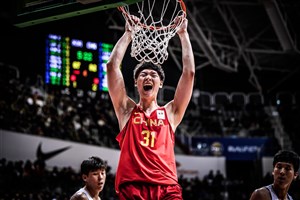
As the world turns - Alle sind dabei
HAMBURG (Steve Goldberg's Wheel World) - To best explain how these Wheelchair Basketball World Championships have gone so far, you should know that the tagline on every volunteer's t-shirt is "Ich bin dabei". Suffice it to say that it feels like everyone is here... "alle sind dabei" as most games have been playing to packed and cheering houses – and then some when Germany is on the court. Hamburg is a multicultural city and those residents with ties to participating countries know how to get to the arena.
The other thing to know is that you are as only as good as your next game.
 Paralympics, world championships... if the Netherlands are competing, the Dutch fans will be there. (Photo by Steve Goldberg/SCS Media)
Paralympics, world championships... if the Netherlands are competing, the Dutch fans will be there. (Photo by Steve Goldberg/SCS Media)
How are the favorites doing?
The USA men, who are defending gold medalists from Rio, and have 10 of 12 players from that squad here, are looking every bit as capable of doing the same in Hamburg, and the women from the Netherlands are giving a new definition to the term Orange Crush (actually an American soft drink).
Germany's women, the 2012 women's Paralympic champions and silver medalists from Rio, are the best bet to challenge the Dutch for top honors with an improving Great Britain looking for their first women's world championship medal.
Watch Germany's last group phase game against China at Wheelchair Basketball World Championships live now! https://t.co/ZkEcWWiVcz #zadonk #wbwc2018 #wbwc pic.twitter.com/WrRpAZYSmp
— Nils Adermann (@naderman) August 22, 2018
Opposite of their men's side, the USA women only brought 2 of the 12 who won gold in Rio and the reality is that this is an important growth experience towards Tokyo 2020. After defeating Algeria, the Americans lost decisively to Germany and China before strong wins over France and Argentina.
Back to the Orange Crush. The Dutch women are on a roll with two players averaging double doubles so far. Mariska Beijer is leading all scorers with 33 points per game and adding 11 rebounds while Bo Kramer is showing why she will be among the world's best with 20.5 PPG and 14.25 RPG.
 Mariska Beijer (Photo by Steve Goldberg/SCS Media)
Mariska Beijer (Photo by Steve Goldberg/SCS Media)
Didn't see that coming…
Then there were the unexpected results from expected contenders.
Spain, the silver medalists from 2016 lost their first three games before finally looking like the team they should be in a round of 16 crossover victory 52-50 over a Japan side that won their group. Then there's Turkey, semifinalists against Great Britain in Rio but losers in two of their first three games here. The Turks righted the ship with a hard fought 60-52 round of 16 win over the Netherlands.
Iran proved that they are a team to be reckoned with, winning their group 3-0 after, including a historic win over Canada. Their success has come from mobile and technically proficient big men who are showing more fitness than in the past. Veterans Morteza Abedi (15.25 PPG) and Morteza Ebrahimi (13.25) along with new blood Omid Hadiazhar (20.5 PPG) and Mohammadhassan Sayari (11 PPG) give them a diverse and dangerous offense.
 Morteza Abedi and Iran recorded a historic win over perennial contender Canada in first round play. (Photo by Steve Goldberg/SCS Media)
Morteza Abedi and Iran recorded a historic win over perennial contender Canada in first round play. (Photo by Steve Goldberg/SCS Media)
Then it was Poland, who finished third in group play behind the USA and Great Britain, finally putting both offense and defense together to knock Canada out of medal contention in the first elimination game.
Round of 16 results/Men's Quarterfinal matchups
Oy Canada!
"The guitar must wait" is the translation of the print article headline in the Süddeutsche Zeitung, one of the largest daily newspapers in Germany and published in Munich. It was a reference to the music side of Patrick Anderson, acclaimed by most as the best player in the game currently and arguably the best of all time.

With consecutive losses to those two teams in pool play and the round of 16, that wait will be far shorter than Anderson and his teammates were expecting.
The article described Anderson as the Michael Jordan of wheelchair basketball. His results over the past two decades certainly liken him to the likes of Jordan, Bird and Magic.
But none of them won by themselves and although Canada is still a very talented team with the experience of David Eng and Bo Hedges, and the emerging skill of Nic Goncin, Hamburg showed defensive issues with the size and pace of Iran and Poland.
Canada's women are 3-2 in pool play, losing their first game to Great Britain and later to the Dutch in between wins over Australia and Brazil. They are still in the medal hunt.
Stat stories
While the Dutch women are dominating both team and individual stats, that's not always an indicator of a successful team.
It's keen to note that the American's leading scorer, Jake Williams, is ranked only 10th among all point makers at 15.5 per game. Patrick Anderson is top of the table at 25.75 with South Korea's Dong Hyeon Gim at 20.75 and Iran's Omid Hadiazhar at 20.5.
While we're here, Anderson is also the leading rebounder at 12.25 per game. The Netherlands Robin Poggenwisch and Korea's Gim follow at 10.5 each. Turkey's Ozgur Gurbulak is averaging 11.5 assists per game so far, followed by Argentina's Adolfo Berdun, 9.0, and Philip Pratt, 8.4. Full leader stats here.
Back to my point. The only category lead by an American is steals where Steve Serio is averaging 2.5 a game and Jarad Arambula is tied for 7th at 1.75. The USA are dominant because no one player dominates. Every player has scored and ten are averaging 5 points per game or more. Five are averaging 3 plus rebounds per game and five are averaging 3 or more assists per game. In one match, the USA had an astonishing 32 assists on 36 baskets. All 12 players are averaging at least 11 minutes per game and their captain, Serio is most at just 25 of the possible 40 that most team leaders are close to.
As a team, the USA have been best in both defense and offense with +64 in scoring (223 for, 159 against) margin in a group where three of four teams won the R16 game.
Next up… men's quarterfinals.
I leave you with this fun post from USA women's coach Trooper Johnson.
Steve Goldberg
FIBA
FIBA's columnists write on a wide range of topics relating to basketball that are of interest to them. The opinions they express are their own and in no way reflect those of FIBA.
FIBA takes no responsibility and gives no guarantees, warranties or representations, implied or otherwise, for the content or accuracy of the content and opinion expressed in the above article.
To help make this column as inclusive as possible, please send any national or international event information, story suggestions, or comments to wheelworldmail@gmail.com.


















